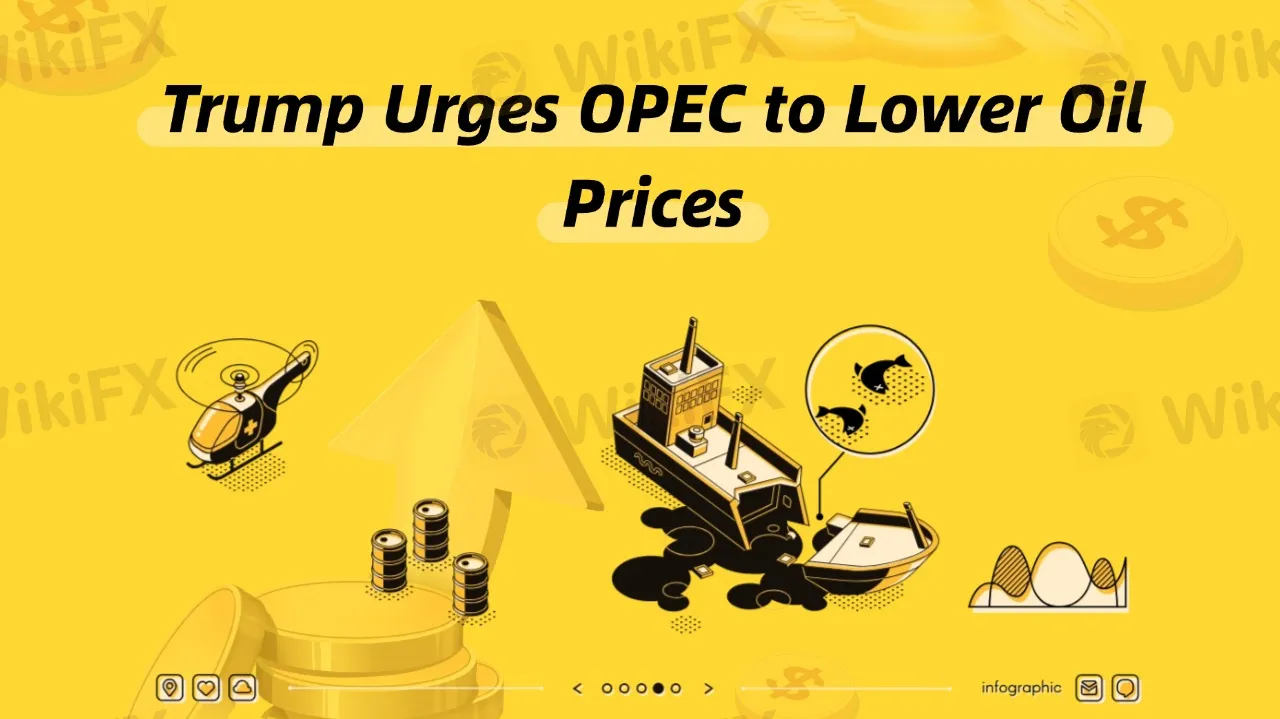简体中文
繁體中文
English
Pусский
日本語
ภาษาไทย
Tiếng Việt
Bahasa Indonesia
Español
हिन्दी
Filippiiniläinen
Français
Deutsch
Português
Türkçe
한국어
العربية
Trump Urges OPEC to Lower Oil Prices
Abstract:As of January 17, the EIA's oil status report showed that crude oil inventories have decreased for the ninth consecutive week, while Trump has urged OPEC to reduce oil costs.

Against the backdrop of fluctuating global oil prices, Trump recently issued a strong call to the Organization of Petroleum Exporting Countries (OPEC) to “lower oil costs.” He stated plans to intervene in the global oil market on a large scale and specifically urged OPEC member countries, including Saudi Arabia, to take measures to reduce oil prices. Trump believes that lowering oil prices will put pressure on Russia, which could lead to the end of the Ukraine conflict. At the same time, he argued that falling oil prices would help alleviate global inflation pressures and create conditions for lowering interest rates. Trump explicitly stated, “As oil prices fall, I will demand an immediate reduction in interest rates, and global interest rates should also decrease.”
Trump's remarks not only exert pressure on OPEC countries but also directly challenge the Federal Reserve's interest rate decisions. He publicly stated that he understands interest rates better than Federal Reserve Chairman Jerome Powell and predicted he would have a conversation with Powell at an appropriate time.
His comments had an immediate impact on the international oil market, with US WTI crude prices briefly dropping by 1.4% and Brent crude declining by 1.2%.
How will OPEC respond?
In response to Trump's call, OPEC's reaction may not be straightforward. As a key global oil-producing group, OPEC members have significant influence over oil price setting and production regulation. However, Trump's intervention may put these countries in a position where they need to weigh complex political and economic factors. Whether OPEC countries will respond to Trump's request largely depends on the global oil market's supply and demand situation and each country's economic interests. If OPEC decides to increase production further, it may lower oil prices in the short term, but it could also impact the fiscal revenues of its member countries, particularly those heavily reliant on oil exports.
Furthermore, OPEC is not fully unified, as some members may prefer to maintain higher oil prices, while others may support increasing production to meet global demand. While Trump's call is clear, OPEC's decision-making process will likely continue to be influenced by complex geopolitical and economic factors. Therefore, whether Trump's request can directly alter OPEC's production decisions remains to be seen.
For investors, keeping a close eye on OPEC and the Trump administration's developments will be crucial in understanding the future direction of oil prices.

Disclaimer:
The views in this article only represent the author's personal views, and do not constitute investment advice on this platform. This platform does not guarantee the accuracy, completeness and timeliness of the information in the article, and will not be liable for any loss caused by the use of or reliance on the information in the article.
Read more

What Determines Currency Prices?
The price of currency directly impacts investor returns. Understanding the underlying causes of currency fluctuations can help investors make more informed decisions in the foreign exchange market.

AvaTrade Launches Advanced Automated Trading Tools AvaSocial and DupliTrade
AvaTrade launches enhanced automated trading solutions, featuring AvaSocial and DupliTrade for seamless, emotion-free trading. Explore cutting-edge tools today!

Kraken Brings Back Crypto Staking for U.S. Users as Regulations Ease
Kraken reintroduces crypto staking for U.S. users in 39 states, supporting 17 assets with slashing insurance as regulations ease.

T4Trade Enhances Forex Trading with Advanced Tools for 2025
T4Trade empowers traders with advanced tools like trading calculators, Trading Central features, and an economic calendar for 2025.
WikiFX Broker
Latest News
Fake ‘cyber fraud online complaint’ website Exposed!
Day Trading Guide: Key Considerations
NAGA Launches CryptoX: Zero Fees, 24/7 Crypto Trading
Scam Alert: 7 Brokers You Need to Avoid
AvaTrade Launches Advanced Automated Trading Tools AvaSocial and DupliTrade
What Determines Currency Prices?
Why More Traders Are Turning to Proprietary Firms for Success
MC Markets Review 2025
How to Use an Economic Calendar in Forex Trading
T4Trade Enhances Forex Trading with Advanced Tools for 2025
Currency Calculator






